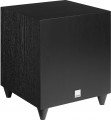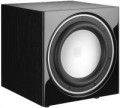Max. sound pressure level
The highest sound pressure level that a subwoofer can create, in other words, the volume that it produces at its maximum power level. This parameter is measured in the same way as any noise level - in decibels; since the decibel is a non-linear quantity, it is easiest to evaluate loudness using comparative tables. So, the most modest modern subwoofers are capable of delivering up to 95 – 100 dB, this is comparable to the volume of a subway car or a chainsaw. In the most powerful ones, it can exceed 130 dB - this is louder than an airplane on takeoff, a long stay near a subwoofer operating at full power can lead to hearing damage.
Note that sound pressure and sensitivity (see above) are fundamentally different characteristics, although they are measured by the same units.
Frequency range
The range of audio frequencies reproduced by the subwoofer. As a general rule, the wider the frequency range, the richer the sound and the more detail the speaker can convey. However, it is worth remembering that subwoofers as a class are designed for low and ultra-low frequencies in the range from 20 to 150 (sometimes 200) Hz. Therefore, in fact, a significant difference in sound is noticeable only with a large difference in the reproducible ranges (for example, 20-200 Hz and 50-150 Hz).
Also, do not forget that an extensive frequency range is not yet a guarantee of high-quality sound; and in some cases (for example, if the main speakers of the speaker also cope well with low frequencies), it may be completely redundant.
Speaker size
The diameter of the speaker(s) installed in the subwoofer.
It is believed that the larger the speaker (
15 ",
18 " and more), the more power it can produce and the deeper the bass will be on such acoustics. However, in modern subwoofers, manufacturers use various tricks that allow achieving good sound depth even with relatively small speaker sizes (
10 ",
8 "). Therefore, it is possible to compare different models only if they differ significantly in this indicator; and even then, in such cases, it is worth paying attention not so much to the speaker diameter as to the price category. The golden mean among sizes is
12-inch subwoofers.

